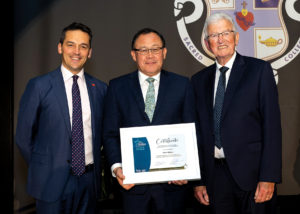Commitment to helping students reach potential
Schools
Dr Paul Rijken is proudly a man of the south. Raised in Christie Downs and long resident of Hallett Cove, he jumped at the chance to join the fledgling Cardijn College at Noarlunga Downs in 1984, and then to return in 2005 as its sixth principal.

In between he spent eight years as a deputy principal at St Aloysius College in the city, amassing four decades of unbroken service to Catholic education in South Australia.
He also was a member of the South Australian Commission for Catholic Schools from 2012 until 2017, and chair of the People and Culture Standing Committee.
Paul retires at the end of Term 2, taking with him fond memories, a sense of achievement, and a Catholic Education SA Award for Leadership/Lifelong Contribution.
Advertisement
The award, presented last month at a ceremony held at Sacred Heart College, acknowledges that his ‘dedication and service to children, young people, teachers, support staff and families has been a masterclass in how to engage and empower people and form meaningful connections with others, all while creating a culture of collegiality and a sense of family’.
In Paul’s view, Cardijn College has always been for and of the community.
The local parish and families lobbied hard for a college in the Southern Vales, and made it very clear what they thought that college should be called.
Since then they have helped build a success story. From barely a hundred students on day one, Cardjin now has more than 1780 students across three campuses.
Paul was still a fresh-faced teacher at Thomas More College in Salisbury when he heard – firsthand – about plans for Cardijn. Thomas More itself was only five years old and Cardijn’s first principal, Br Walter Smith, came visiting to learn a little about is progress.
“When I found out who he was and that he was building a school down south I said, ‘I have to meet this guy’. Soon afterwards I saw an advertisement, applied and was successful,” Paul said.
The next 13 years were exciting, challenging, at times stressful but ultimately rewarding as the vision for Cardijn became a reality. The eight that followed helped shape Paul’s ideas of what was possible.

Dr Paul Rijken at the awards ceremony with Education Minister Blair Boyer, and Professor Denis Ralph, chair, South Australian Commission for Catholic Schools.
“One of the great things that I got to appreciate at SAC was that Sr Judith Redden and the team had the vision that everyone who walked through the doors had the potential to be whatever they wanted to be,” he said.
“The socio-economics were so diverse. I saw young women and girls who you might consider the battlers of society doing so well. When I came back to Cardijn that was really ingrained in my mind.”
Advertisement
Some people did suggest to him that he couldn’t expect similar levels of academic achievement “down south” – but that was red rag to a bull for a boy from Christie Downs.
In 2011, a Cardijn student received an ATAR of 99.95 for the first time. The same year saw a first Governor of SA Commendation. In the five years to 2020 at least one student was commended with the Governor’s award each year.
“More and more ATARs in the high 90s followed and there was no turning back,” Paul added. “It set the foundation of academic excellence.”
Just as significant for the future of the Catholic education model has been the sustainable integration of Marcellin Technical College. This provided a more viable support structure for the previously standalone college and broadened Cardijn’s academic base.
A third campus, Cardijn Galilee, has added a primary and middle school to the mix.
All this growth did bring one personal change for Paul, however. He finally had to give up his beloved maths and RE teaching to ensure his administrative duties got the attention they required.
Related Story
Catholic school educators honoured at awards
Looking back on 42 years in Catholic education, he is conscious of how much more complex teaching and life in general have become, and how much more engaged parents and students are – and want to be – in the education process.
Ultimately, he gets the greatest pleasure from seeing “people who have made something of their lives and they still connect to their own school”.
“I’ve gone into this job to make a difference for young people and if I can still have that relationship after I’ve left then I feel really good about that,” he said.







Comments
Show comments Hide comments